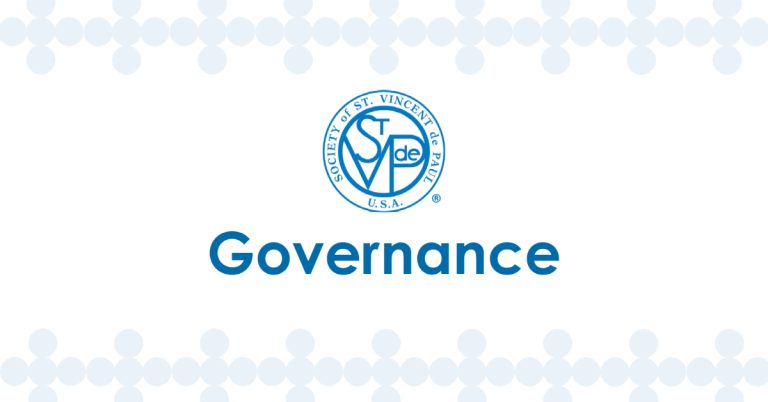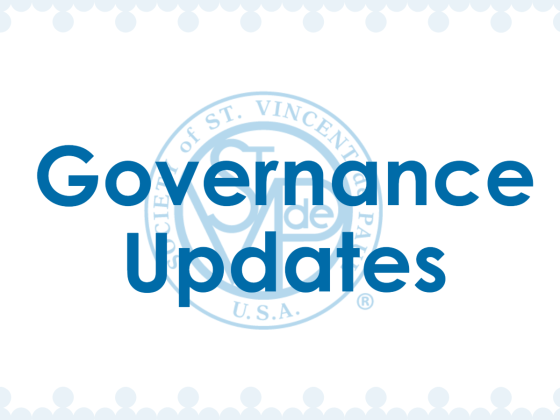The original Bylaws presentation was developed and presented by John Berry, SVdP National President-Elect. This article was written by Mike Syslo.
The Boring Stuff
What are Bylaws: Bylaws are a nonprofit’s operating manual. Bylaws (or Bylaws and Articles of Organization) are the main governing document for a nonprofit organization. They are the main official documents of an organization, nonprofit or for-profit. One of the important things to remember about Bylaws is that the operations of your organization must be in line with what you say they are in the Bylaws and Articles.
The purpose of the Bylaws is to guide the nonprofit Board’s actions and decisions. They are helpful in preventing or resolving conflicts and disagreements. They can protect the organization from potential problems by clearly outlining rules on authority levels, rights and expectations.
If the Board of Directors fails to follow the Bylaws, it can be held liable for breaching its duty to the organization. Breach of duty can cause a significant liability for the Board of Directors. Breach of duty can also result in the organization losing its nonprofit, tax-exempt status. The loss of nonprofit status would mean a loss of tax deductibility for donors and the need for the organization to pay taxes on their income.
“Bylaws determine how an organization is structured. For example, most Bylaws specify whether an organization has members, define the duties of officers and Board members, and identify standing Board committees. An important function of Bylaws (if this matter is not covered in the Articles) is to specify how Board members are selected.” (BoardSource)
What About the Rule?
All groups require rules for effective operation. Our Rule is drawn from the lives and experience of all Vincentians throughout the world. It describes the elements that are needed to maintain the unity of the Society. There is no group or organization that exists without some set of rules.
In 1835, two years after its founding, the Society formulated its Rule, a series of Articles based upon the practical experiences of the first Vincentians. The Rule of the Society has continued as the guide and blueprint for the Society for the past 188 years. This, alone, is a tribute to its efficacy and to the Holy Spirit who inspired it. The Rule has gone through a few modifications over those many years, but the essential spirit of the Society that is reflected in the Articles and Statutes is the same as in the first Rule.
Bylaws and the Rule: The Relationship
Bylaws are significant written rules by which an organization is governed. They determine how the Society of St. Vincent de Paul is structured and, along with state law, determine the rights of participants in the structure.
Membership in the National Council of the United States, Society of St. Vincent de Paul, Inc. requires that every organizational unit (Conference and Council) have Bylaws. Prior to 2003, the Rule included both the philosophy of the Society and its structure and responsibilities. Since 2003, philosophy has been in the Rule and the structure and responsibilities have been in the Bylaws. Having the original format of the Rule split into two separate documents has caused the need for all Conferences and Councils to adopt a set of Bylaws and operate in accord with both Rule and Bylaws.
Conferences and Councils must maintain their Bylaws (including any and all amended articles) in updated and amended form. The Conference or Council must keep a copy of their Bylaws together with the Rule document (The Manual 1.3). In addition, the next higher Council should have a copy of the Bylaws. For example, a District Council should have a copy of the Bylaws of each of its Conferences. The Diocesan Council should have a copy of the Bylaws of each of its District Councils.
The Rule is the paramount authority of the Society of St. Vincent de Paul. Should any bylaw, rule or regulation adopted by a Conference or Council conflict with the Rule and statutes of the Society of St. Vincent de Paul as now promulgated or hereafter adopted by the Council General International or the National Council of the United States, such bylaw, rule or regulation shall be void and of no effect (The Manual 1.3). This needs to be very clear in everybody’s mind. You cannot put anything into the Bylaws that in any way conflicts with the Rule or Nationally Approved Bylaws. If a conflict exists, the Bylaws will be rejected by the next higher Council; and you may not proceed with them.
BUT – Bylaws have been created to be used by SVdP entities across the country and as such do not include language that may be required by your state and local law (see listing of multiple versions of Bylaws on page three). It is strongly advised that legal advice be sought from a local attorney concerning matters such as the following: non-discrimination policy language, tax-exemption requirements, and any other areas of the Bylaws in which modification of the language is necessary in order to be in alignment with applicable state and local law. As of this date, we have not found anything of substance in the Nationally Approved Bylaws that conflict with state and local law.
Since the Bylaws have been developed to be in conformity with the Rule of the Society, Bylaws should be modified only to address alignment to state and local law (Bylaws Introduction, SVdP USA).
Where Did Our Bylaws Come From?
In 2003, the Council General International approved an updated version of the Rule of the Society. Each separate Superior/National Council was invited to draft their own Part III of the Rule to define the items of the Rule that are unique to each country. This new version of Part III of the Rule for the United States was different from the former Rule in that details of structure and governance were removed. Those details were then placed in Bylaws which varied with each type of SVdP structure within the United States. Placing the structure and governance concerns of the Society into a separate document has forced Conferences and Councils to adopt an appropriate set of Bylaws for their use.
The Bylaws documents were approved by the National Council Members at the Society of St. Vincent de Paul’s 2005 Annual Meeting and have been revised as needed (last in 2021) so that good governance policies are in place and are in compliance with:
- The Rule of the Society,
- The Charter of the Society (a.k.a. Articles of Incorporation),
- Bylaws of the National Council while leaving flexibility for compliance with national and state laws that govern charities.
How Many Kinds of Bylaws Are There for Councils and Conferences?
Because of the possible structures that exist for unincorporated and incorporated Conferences and Councils, multiple versions had to be created. There is one set of Bylaws for the National Council and three sets of Bylaws to choose from for each Conference, District Council and Diocesan Council.
- BYLAWS for Conferences without a Board of Directors
- BYLAWS for Conferences with a Separate Board of Directors
- BYLAWS for District Councils with a Separate Board of Directors
- BYLAWS for Archdiocesan/Diocesan Councils with a Separate Board of Directors
- BYLAWS for the National Council
- BYLAWS for District Councils with an Integrated Board of Directors
- BYLAWS for Archdiocesan/Diocesan Councils with an Integrated Board of Directors
- BYLAWS for District Councils without a Board of Directors
- BYLAWS for Archdiocesan/Diocesan Councils without a Board of Directors
- BYLAWS for Conferences with an Integrated Board of Directors
Why Do We Need These? Let’s Just Follow the Rule.
Because Bylaws may be cumbersome, they are frequently neglected or even disregarded as a tool for governance. They are, however, essential to maintaining order and propriety within the organization.
SVdP governing entities must pay careful attention to Bylaws. They can take on added importance during governance disputes centering on the way an organization is carrying out its mission. These disputes can take many forms:
- A non-conforming entity needs dissolution.
- A Board member who is voted out of office seeks reinstatement.
- A dissident group within the organization attempts to gain control or a faction mounts a legal challenge to a Board decision.
In these difficult situations, carefully-crafted Bylaws, and adherence to them, can help ensure the fairness of governance decisions and provide protection against legal challenges.
Bylaws determine how SVdP is structured. Bylaws specify whether an organization has members, define the duties of officers and Board members, and identify standing Board committees.
An important function of Bylaws (if this matter is not covered in the Articles of Incorporation) is to specify how Board members are selected. This, along with the specification of the maximum number of Board members, determines how workable as a team the governing body is.
Bylaws, along with state law, determine the rights of participants in the structure, such as the rights of members to be notified of meetings, the rights of Board members or officers whom others may want to remove from office and the rights of Board members to indemnification.
Bylaws determine many procedures by which rights can be exercised. For example, Bylaws may require a certain form of notice for meetings, or they may specify whether Board meetings can be held by telephone or whether elections can be conducted by mail. Other procedures defined in Bylaws pertain to the election/selection of officers.
The Fun Stuff – Some Real Situations
- The Board of the Diocesan Council, in putting together its slate of officers for the next year has asked Christi to serve as Vice President. Christi has been on the Board for the last three years and they all think she’d be a good fit for the VP job. Christi started volunteering with SVdP when her Church, United Methodist, partnered with the Council on their Food Pantry.
-
- Bylaws issue or Rule issue?
This is both a Bylaws issue and a Rule issue. Christi is non-Catholic and cannot serve as an officer. The President of the Diocesan Council appoints the officers after consultation with the District Presidents – not the Board.
- Christopher was just elected as President of the Council. He has never gotten along with Gracie, the ED; so right after he is installed as President, he fires her and puts Jake in the job.
-
- Bylaws issue or Rule issue?
This is a Bylaws issue. It is the responsibility of the Board of Directors (not the President) to hire and fire the ED/CEO.
- The new President of the St. Frederic Ozanam Conference presents his new officers to the Conference at his first meeting. Tom raises an objection to the new Treasurer and Secretary and says he will not support them. Others in the room agree.
-
- Bylaws issue or Rule issue?
- Bonus issue!
This is a Bylaws issue, a Rule issue and an Aggregation issue. The President appoints the officers after consultation with the Conference. “Consultation with” does not mean “approval by.” The President may decide that the objections are not sufficient for a change in choice. The Conference must work as a team and refusing to support the officers is not an option. Also, it may have been overlooked, but Frederic Ozanam has not yet been canonized – he is Blessed Frederic. In addition, unless the parish in which the Conference resides is named for Frederic Ozanam, Conferences are prohibited from having his name. The same holds true for “St. Vincent de Paul.”
- At the regular second meeting of the month, Katie, a member of the St. Mary’s Conference and a member of the parish staff, tells the Conference members that the Church’s A/C system has broken and it’s going to cost the parish $60,000 for a replacement system. The Conference President suggests that the Conference use $10,000 from its bank account to ‘help the parish defray the cost’.
-
- Bylaws issue or Rule issue?
This is a Rule issue. Conferences and Councils are prohibited from giving donations to (and this includes raising funds for) outside organizations no matter how worthy the cause may be. The parish is an outside organization. The funds of the Society must be used for the purposes of the Society.
In Summary
Because your Conference or Council uses the National Council’s trademarked name “Society of St. Vincent de Paul” with the express permission of and a limited license issued by the National Council, the Bylaws adopted by your Conference or Council must be formally approved.
Conferences must have their Bylaws approved by their District Council. The District Council Bylaws must be approved by the Archdiocesan/Diocesan Council. Archdiocesan/Diocesan Council Bylaws must be approved by the National Vice President for the Region.



